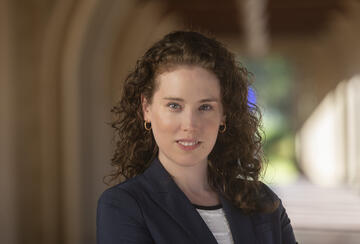News

It's the second recognition this year for Sherri Rose, whose work is making significant contributions to health statistics.

In The Politics of Order in Informal Markets: How the State Shapes Private Governance, Grossman explores findings that challenge the conventional wisdom that private good governance in developing countries thrives when the government keeps its hands off private group affairs.
In January, President Donald Trump’s supporters rampaged through the U.S. Capitol in an attempt to derail Congress’s certification of the 2020 presidential election results.
Guest author Maiya Evans reflects on her EPIC project, which challenges students to reimagine public health.

Author George Magnus, Research Associate at Oxford University’s China Centre, features research from Scott Rozelle in this Financial Times letter.

Haley Gordon (MA '21, East Asian Studies) was awarded the 10th annual Korea Program Prize for Writing in Korean Studies, for her paper "Nation-Being in North Korea: New Perspectives on Human Rights."
In its third major decision about the Affordable Care Act, the U.S. Supreme Court rejects efforts to undo the popular health care law.
As the United States embarks on an effort to modernize many elements of its nuclear enterprise, it needs to consider how dependencies on modern information technologies could lead to cyber-induced failures of nuclear deterrence or to nuclear war.
Stanford’s Center for Open and Reproducible Science aims to make science – and research in general – more effective and accessible. “Stanford is absolutely the right place to have a center like CORES because we have such a strong tradition of data science," says SHP's Michelle Mello, a member of the CORES executive committee.

Stanford University microbiologist David A. Relman said the political climate last year made many scientists hesitant to express openness to the lab-leak idea. They did not want to align themselves with a theory closely associated with Trump and his allies, who referred to the coronavirus as “the China virus.”
In this article by the Wire Scott Rozelle, SCCEI Co-Director and development economist, talks about the middle income trap, educating China's children, and why we should all want China's economy to succeed.

Stanford Health Policy and the Kaiser Family Foundation are collaborating to examine the disparities in meeting vaccination benchmarks by using state-reported vaccination data by race/ethnicity and projecting vaccine coverage going forward.

U.S. President Joe Biden and Russian President Vladimir Putin held a short summit yesterday in Switzerland that both sides described as substantive, efficient, and without rancor. Did the meeting advance Biden’s objective of building a stable and predictable U.S.-Russia relationship? The short answer: too early to tell.

At the program’s second virtual graduation ceremony, Professor Jeremy Weinstein praised students for their perseverance and desire to enter public service during a globally redefining moment in history.

Despite tensions in the summit lead-up, the two leaders were overly cordial in their remarks after the meeting. Rose Gottemoeller, lead US negotiator for the New Strategic Arms Reduction Treaty (New START), joined The World's host Marco Werman to offer insight.

Incorporating Health Equity Into COVID-19 Reopening Plans: Policy Experimentation in California
Michelle Mello evaluates the benefits and challenges of California's novel health equity focus in its reopening efforts and outlines recommendations for other U.S. states to address disparities in their reopening plans.

As European leaders welcome Biden back into the club, can they count on the US to be a long-term ally? Former NATO Deputy Secretary General Rose Gottemoeller discusses Western democracies and rising autocratic governments resonate with his European counterparts.
This year’s Rosenkranz Prize winners are both working to better understand preeclampsia in pregnancies and a form of childhood malnutrition in lower-resourced countries in an effort to find medical interventions.

In his new role on the Civil Rights Cold Case Review Board, Dr. Carson, a seminal scholar on the life and writing of Dr. Martin Luther King Jr., will review dozens of unsolved and racially motivated murder cases from the civil rights era.

From the moment, President Biden and President Putin extended the New Strategic Arms Reduction Treaty (New START) in February, they created hope that although the US-Russian relationship is in dire shape, our two countries can continue to work together to reduce and eliminate nuclear weapons.

SPICE offers a series of Korea-focused lesson plans, an online course for U.S. high school students, and teacher professional development opportunities.
Opinion piece from The Hill

"Other countries might be able to address their shrinking workforce by replacing quantity with quality. But according to Invisible China, a new book by Scott Rozelle and Natalie Hell, the Chinese labour force has one of the lowest levels of education of any comparable country..."
The awards honor individuals for their outstanding work supporting women at Stanford through role modeling, allyship, leadership and sponsorship.




![[Left to right]: Michael McFaul, Marshall Burke, Steven Pifer, Oriana Skylar Mastro, Didi Kuo, and Amichai Magen on stage.](https://fsi9-prod.s3.us-west-1.amazonaws.com/s3fs-public/styles/480x270/public/2024-10/fsi_reunion_2024_panel_hero.png?h=c4d9845d&itok=s9RgEIqP)








